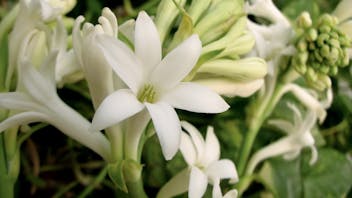Product Overview
The lively aroma of our strongly aromatic Yuzu essential oil – distilled from the peels of these uniquely scented citrus fruits – is amazingly robust and provides a lasting citrus top note! It has a bright, strong, faintly floral, citrus aroma in the manner of Bergamot or Grapefruit, with a zesty, green citrus/pith backnote that becomes a balsamic sweetness in the drydown; a unique citrus aroma that lasts longer than other citrus peel oils.
Two constituents have recently been identified as key to this citrus peel’s distinctive odor profile that contribute significantly to its notable aromatic aspects[1]: (6Z, 8E)-6,8,10-undecatriene-3-one (yuzunone), also found in Galbanum, and (6Z, 8E)-6,8,10-undecatriene-4-ol (yuzuol). "In particular, yuzunone and yuzuol increase the balsamic, sweet, and floral characteristics that distinguish the Yuzu aroma from other citrus fruits."[2]
Citrus junos is a cold-hardy, evergreen tree that grows wild in its countries of origin – Tibet and Central China – and is cultivated widely in Japan and Korea. In a Japanese tradition that dates back to the early 18th century, the whole fruits, usually wrapped in cheesecloth, are floated in a hot ceremonial bath to bring out their scent on the night of the winter solstice – an experience that is both invigorating for the skin and elevating for the spirit. While most citrus peels are rather high-yielding, it takes roughly 300 kilos of grated Yuzu peel to make just 2 kilos of Yuzu essential oil.[3] To make the most of available resources, our producer in Japan obtains the aromatic fresh peels that remain after juicing the fruit to vacuum distill our Yuzu essential oil. Following distillation, the leftover Yuzu peel slurry is dehydrated in a dryer fired by post-distillation Hinoki Wood chips to be used as an antioxidant additive for animal feed.
A review of the chemical constituents of Citrus junos shows remarkable diversity for any oil – much less one from a relatively simple citrus peel; some of these constituents were first identified in (or have origins far from) the usual botanical suspects: Yuzu oil contains significant or trace amounts of shared chemistry with Elemi, Ylang Ylang, Citronella, Geranium, Thyme, Caraway, Neroli, Cumin and Lavender! As with all citrus peel oils, Yuzu has a high limonene content, therefore we recommend storage of this oil in the refrigerator and in a dark, airtight glass container to avoid oxidation.[4] Potentially phototoxic coumarins are not present in the essential oil of Yuzu in sufficient quantity to pose a risk – a characteristic shared by only a few other citrus peel oils.[5] It is well suited for skincare and cosmetic preparations, calming baths and massage blends, and is refreshing and enlightening in diffusers and natural perfumery creations.
1 Rhind, Jennifer Peace. Aromatherapeutic Blending – Essential Oils in Synergy, 2016, pp. 253-4.
2 Dugo, Giovanni and Luigi Mondello. Citrus Oils, 2010, p. 465.
3 Industry communication.
4 Tisserand, Robert and Rodney Young. Essential Oil Safety, 2nd ed., 2014, p. 480.
5 Ibid, p. 254.



